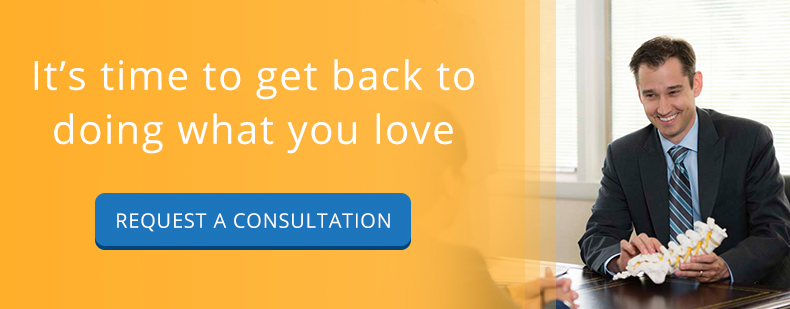Is your prolapsed disc pain making it difficult for you to do the things you need and want to do? If you’ve been battling prolapsed disc pain and it’s not getting better or is changing, it may be time to seek the advice of a doctor. While some cases resolve on their own, others require the skills of a knowledgeable neurologist or neurosurgeon to bring you back to full health and functionality.
What Is a Prolapsed Disc?
A prolapsed disc (also commonly known as a “slipped disc” or “herniated disc”) most commonly occurs in the lumbar (lower) area of the back. To better understand how a prolapsed disc happens, it’s helpful to know how the different structures in the spine work.
A Quick Look at the Spine
The spine is made up of vertebrae and discs. Vertebrae are the bone structures, whereas the discs are rubbery “cushions” that sit between the bones of the spine. They serve many functions – they provide protection to keep the vertebrae from rubbing up against one another, allow for optimum flexibility of the spine, and protect the spinal cord and nerves.
A Prolapsed Disc in Simple Terms
The term “slipped disc” may be a bit of a misnomer – the disc doesn’t actually slip from between the vertebrae, as one might imagine. In reality, the soft, inner part of the disc will bulge through a weaker area of the more rigid disc wall, allowing the nerves of the spinal cord to be pressed on or irritated.
What Can Cause a Prolapsed Disc?
Slipped discs, like bulging discs are often part of the normal aging process. As your body ages, the discs begin to weaken slightly, making it more likely that a herniation can occur.
In some cases prolapsed discs are situational and in others, they may be congenital. It’s still unclear exactly what predisposes some people to develop prolapsed discs, while others who participate in the same activities or live similar lifestyles never experience them.
Heavy lifting is often the culprit in the development of a prolapsed disc. If you work in a job that requires you to do a lot of lifting or picking up and carrying heavy loads, this can be a major contributor. On the flip side of that coin, those who do a great deal of sitting (such as drivers or office workers) can also experience prolapsed discs. While work is probably the most common place to experience a slipped disc, there are other contributors to their development. This can include sports such as weightlifting or shot put.
Interestingly, other, less strenuous activities can also create the perfect situation for a prolapsed disc, such as coughing, sneezing, bending in strange positions or even smoking and obesity.
The Common Symptoms of Prolapsed Discs
Prolapsed discs are often asymptomatic but depending on the severity of the case, pain and symptoms may arise. It is possible you are suffering from a prolapsed disc if you are experiencing:
Sudden Back Pain
If you find that you’re experiencing intense and sudden back pain, you may have a prolapsed disc. While it is usually during or immediately following strenuous lifting or twisting, it can happen for no apparent reason, as well. Sneezing, coughing or any movement of the affected area may increase the pain.
Sciatica or Other Nerve Root Pain
Nerve root pain is caused by a nerve becoming pinched, trapped or pressed on by the prolapsed disc or the associated inflammation that can accompany this type of injury.
Sciatica can be experienced from the hip to the toes, or any area along the length of the leg. Sometimes it will accompany back pain, or the sciatic nerve will be the only affected nerve, isolating the pain to the leg region. The pain can be intense and is sometimes accompanied by some numbness or tingling.
If the sciatic nerve is not being impacted, prolapsed disc pain can still be a very painful proposition with the number of other nerves that might be irritated or impinged by the slipped disc. Most of the time these will manifest with symptoms such as weakness, numbness, tingling or small “shocks” of pain in one or both legs, feet or buttocks.
Making the Decision to Seek Medical Care
Most of the time, your prolapsed disc will resolve on its own. If the prolapse isn’t too great, the soft inner portion that has bulged through the outer wall of the disc will recede back into its normal position given time.
In some cases, however, a prolapsed disc can persist or get even worse. If you’re experiencing a great deal of pain that won’t go away, you should seek the help of a doctor. Much of the time they can prescribe medications and/or exercise regimens (and even physical therapy) to help you get back to normal.
If this doesn’t work, however, there are surgical procedures that can address your prolapsed disc pain and help prevent it from returning. This is usually only explored if symptoms haven’t improved, or if they’ve worsened after six weeks or more.
A skilled neurosurgeon can perform a partial discectomy, in which the damaged portion of the disc is removed to relieve the pressure on the affected nerves. In general, most doctors will want to explore other avenues before suggesting surgery, but it’s nice to know that there are options out there to permanently relieve the symptoms of a prolapsed disc.
If you’ve reached a point where you can no longer bear the pain, make an appointment with your general practitioner. He or she can assess your prolapsed disc and advise you on the best course of action. If it’s deemed appropriate, they can provide you with a referral to a reputable neurosurgeon to discuss your treatment options and get you back on your feet!


